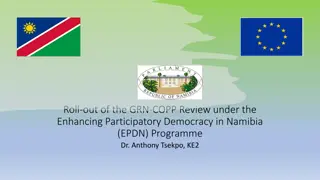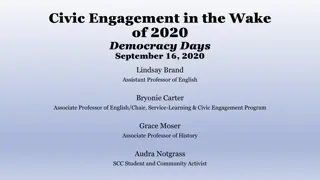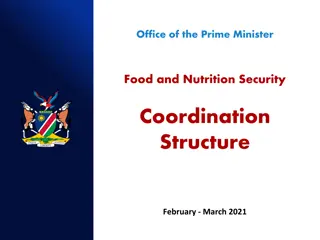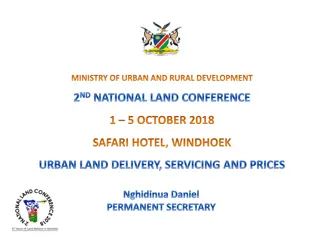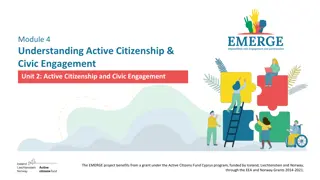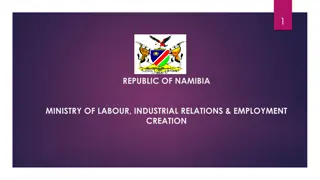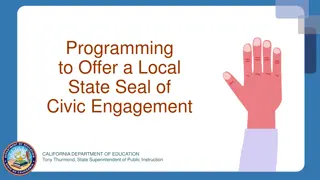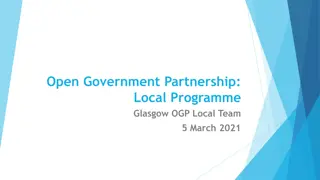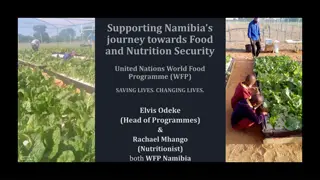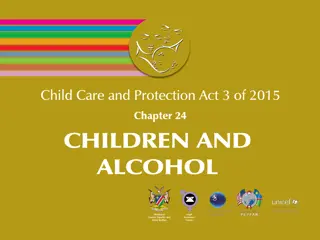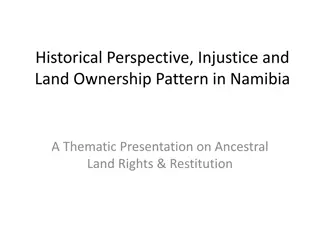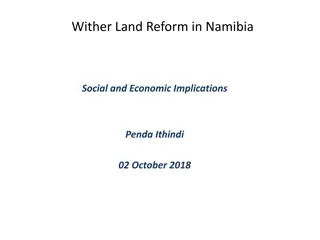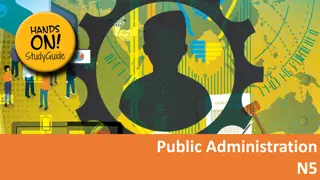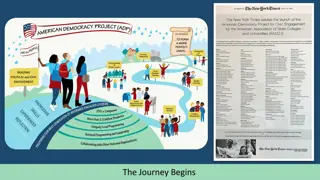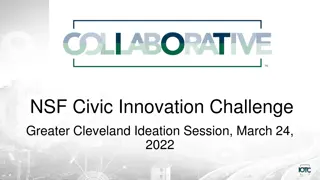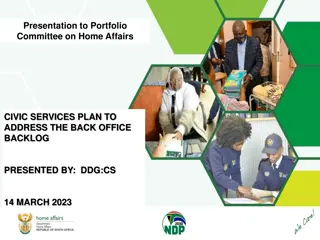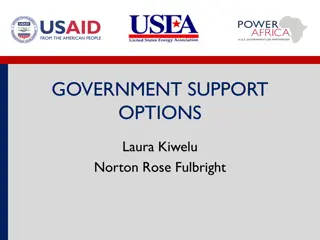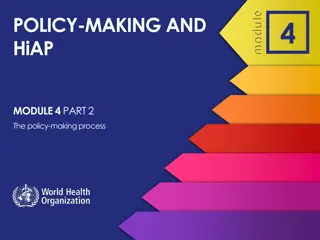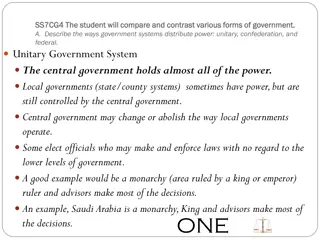Government of Namibia Civic Organizations Partnership Policy Highlights
This document presents the highlights of the Government of the Republic of Namibia Civic Organizations Partnership Policy from December 2005 to August 2022. It covers the historical and contemporary factors shaping civil society in Namibia, the legal and regulatory environment for civic organizations, and the overall goal, objectives, anticipated outcomes, and strategies of the policy.
Download Presentation

Please find below an Image/Link to download the presentation.
The content on the website is provided AS IS for your information and personal use only. It may not be sold, licensed, or shared on other websites without obtaining consent from the author. Download presentation by click this link. If you encounter any issues during the download, it is possible that the publisher has removed the file from their server.
E N D
Presentation Transcript
SUMMARY HIGHLIGHTS ON THE GOVERNMENT OF THE REPUBLIC OF NAMIBIA CIVIC ORGANISATIONS PARTNERSHIP POLICY DECEMBER 2005 22ndAugust 2022, by Ronny Dempers ,from Namibia Development Trust
SITUATION ANALYSIS PRINCIPLES UNDERLYING THE POLICY WHAT WILL BE COVERED OVERALL GOAL, OBJECTIVES, ANTICIPATED OUTCOMES AND STRATEGIES INSTITUTIONAL FRAMEWORKS
Title : GOVERNMENT OF THE REPUBLIC OF NAMIBIA CIVIC ORGANISATIONS PARTNERSHIP POLICY ABOUT THE POLICY Date adopted : December 2005 by Cabinet Responsible Authority : Office of the President NATIONAL PLANNING COMMISSION
HISTORICAL AND CONTEMPORY FACTORS THAT HAVE SHAPED CIVIL SOCIETY Contemporary Factors Historical factors The realisation that the Government cannot do it alone and that local and/or sectoral association and organisation can lead to essential development gains. The legacy of colonisation and apartheid where many types of civic organisations were banned by the South African Government, and where civic actions were closely monitored, if allowed at all The disinterested attitudes that promote a tendency to leave everything to the Government, rather than take an active role the emergence of civic organisations that once were sympathetic to the governing party, now having become critical of it. the limited avenues for participation in the market economy and the opportunity to access donor funds have provided a potential career avenue for people to form COs, who would otherwise be working in business. The adoption of western models of civil society, rather than developing models that are based on the search and adaptation of indigenous and African models of civil society. the growth in employment opportunities for many Namibians in both the public and private sectors, leaving the non-government sector with a shallow human resource base.
Under the current legal and regulatory framework,COs have the option to be registered and operate as: Voluntary Associations (VAs) (under common law) with very few regulatory requirements. All such VAs have to be membership based, and this must be reflected in their constitutions and by- laws. Trusts and Foundations (Trusts Moneys Protection Act No.34 of 1934) where the trust deed is a more formal legal document, which is registered with the Master of High Court. Trusts are never membership organisations, but are governed by a Board of Trustees, appointed by the Trust. CURRENT LEGAL AND REGULATORY ENVIRONMENT Section 21 of Companies Act, No: 28 of 2004 (Companies not for gain, not having a share capital, as part of the Companies Act) where the most formal legal document defines the rights and obligations of members, and more public reporting about the management and finances of the organisation is required. It should be noted that all VAs would in principle have the opportunity to establish and register as a Section 21 of Companies Act, No: 28 of 2004. Welfare Organisations (Welfare Act No.12 of 1979) , granted by the Ministry of Health and Social Services). This arrangement relates more to the special recognition of an organisation as a welfare organisation in addition to being set up under any of the three possibilities above. Registration and/or incorporation within the framework of Acts of Parliament, official Government policy or Cabinet decision. Co-operatives, (under Cooperative Act No. 23 of 1996), Trade Unions, Councils, such as the Sports Council and Youth Council, School Boards are all examples
The need to improve upon the current legislative and institutional framework This is (was) recognised in NDP2. Consequently, this policy calls for the formulation of a New Bill , to establish a transparent, voluntary, parallel registration process in order to complement existing provisions and to nurture the principles of partnership.
EMERGENCE OF PARTNERSHIPS Some of the multiple reasons for low levels of involvement in policy and strategy implementation are listed below: A range of Government bodies have taken the lead in delivering policies that promote participation, including local and regional Government, independent local development agencies and central Government operating locally targeted measures. COs are insufficiently aware of policy components and miss the opportunity to actively participate both in the formulation of strategies and the implementation of such strategies. The Government has not been sufficiently forthcoming in creating awareness amongst COs about what participation (co-operation and collaboration) opportunities exist, arguing that it is the role of COs to identify and propose strategies for collaboration. Lack of a partnership policy framework. Formal recognition of COs and a degree of institutionalisation of partnership are desirable in this regard. The Government immediately after independence, having recognised the important role that COs can play in development, made provision for CO involvement in policy development and implementation. Indeed the role of civil society is mentioned in virtually all Government policies. COs fear that their roles may be instrumentalised in the sense that they may become part of the Government bureaucracy without being given the resources to carry out their assigned functions. Notwithstanding the fact that partnerships between COs and Government have been rather limited to date, the concept is not new. Government recognises that development has to be bottom-up and must include the active participation of citizens and their organisations, thus democratising development . However, in practice, CO participation has, arguably, been rather minimal. Indeed, the Policy highlighted number of positive experiences of such partnerships, the most important of which are as follows:
SOME EXAMPLES OF PARTNERSHIPS MENTIONED IN THE POLICY Formal and/or informal inclusion of the Government in CO structures to improve policy implementation through better communication and joint activity planning. An example is the JCC which has a Minister as its Patron. COs participation on Fora, Boards, Committees and Commissions established by the Government. A formal relationship regulated through Acts and/or Cabinet decisions - Trade Unions, Council of Churches in Namibia (CCN), Co- operatives, sports organisations, school boards, Farmers Extension Development (FED) groups, etc. The Government has entered into co-operation with some COs delegating functions and authorities to COs, to be carried out on behalf of and in conjunction with the Government. Private-Public Partnerships (PPP) to undertake a project and/or provide services. Partnerships occur often at local levels where local authorities share the responsibility of providing services with NGOs.
CIVIL SOCIETY AS DEFINED IN THE POLICY The term civil society is complex and has been ascribed many different meanings. For the purposes of this Policy , Civil Society is deemed to encompass all public activity by individuals, their voluntary organisations, the private sector as a sector and their relationships with each other as well as with the Government. The term refers to all levels within a country, from grass roots to national, and indeed beyond borders, as the concept of a global civil society becomes stronger. By definition, civil society houses diversity and difference. It emerges as a result of freedom of association, which enables citizens to organise around interests or values. If there were no freedom to associate, there would be no civil society. In a democracy, freedom is not handed out selectively. Civil society, therefore, comprises groups, networks, movements and interests sympathetic to national development goals and objectives and others who may be hostile to it. Association of freedom includes the right not to associate . Therefore, unlike the Government, civil society should not be seen as a uniform entity which can be consulted or recruited for a specific purpose.
The term civic organisations refers to a wide range of organisations found at all levels of civil society between the individual or family and the state, and which become involved in activities that pursue the interests of their members, sponsors and/or beneficiaries. These include NGOs, Community-Based Organisations (CBOs), various clubs (such as service clubs and sporting clubs) and interest-groups (such as trusts, foundations, women s groups, trade unions, chambers of commerce, hawkers organisations, and faith organisations). Individual businesses, which are part of society s economic structure, are excluded from this definition. It should be noted that the term Civil Society Organisation (or CSO) has not been used in this policy document for the avoidance of ambiguity. Under NDP2, CSO was used to describe networks and mass membership organisations, but not NGOs or CBOs. Under this policy, Civic Organisations refers to ALL the organisations of civil society, including CBOs and NGOs
Civic organisations have the following characteristics in common They are non-profit distributing They operate in the public interest or in the interest of their members and/or sponsors. They adhere to democratic structures. Involvement is voluntary. They portray high levels of participation. They emphasise empowerment of beneficiaries. They operate independently (both financially and administratively) from the state and donors
Government and Intermediary Organisations The Government and its agencies assume the responsibility to stay in close contact with citizens, either directly or through civil society and its civic organisations. Political parties are part of the political make-up of society and are therefore not civic organisations. Traditional authorities not part of civil society The Office of the President through the NPC plans and directs the course of development and interacts closely with civil society. Ministries are responsible for drafting policies, which are adopted by the Cabinet. In these policies the participation of civil society is stressed and partnership with civic organisations recommended. In addition, the office initiates fora, platforms and commissions in which the opportunity exists to discuss and make recommendations of national importance. Local Authorities and Regional Governments) have emerged as very important partners of civic organisations. At local level many partnership arrangements exist, such as in low cost housing (for example, with the Shack Dwellers Federation), and with informal market operators, etc. decentralisation policy and enabling act, partnership opportunities are likely to increase. In terms of regional and local planning, the various development committees (Regional, Local, Constituency, Settlement Development Coordination Committees) established under the policy provide a platform for dialogue and joint action. All stakeholders should be party to these committees. The Presidential Economic Advisory Committee (PEAC), Presidential Commissions, the drafting of Vision 2030 and the Smart Partnership concept are examples. The Parliament as the legislative arm of the Government consults citizens prior to the promulgation of laws through Parliamentary Standing Committees, which arrange public meetings and hearings.
All partnerships should ensure that: Each actor has a recognised role and a clear idea of the benefits to them. Guiding Principles : Representatives on the partnership structures are committed individuals with significant authority and influence within their respective agencies. There are clear lines of communication between the partners and effective boards, committee and forum structures. Partnership structures stay flexible to accommodate change with changing circumstances
OVERALL GOALS, OBJECTIVES, STRATEGIES AND OUTCOMES
To create a greater commitment for civic participation through the promotion and encouragement of active citizenship. To enhance the environment for civic participation and partnership. POLICY HAS 4 MAIN OBJECTIVES To bring the Government closer to the people and create partnership opportunities that benefit the Government, COs and civil society. To enhance the capacity of partners (the Government and COs) to enter into partnerships and jointly respond to development challenges and opportunities in an efficient, effective and sustainable fashion.
OBJECTIVE Objective 1 Rationale Outcomes Implementation Strategies To create a greater commitment for civic participation through the promotion and encouragement of active citizenship There is a need to raise awareness for civic participation and enable citizens to play an active role in issues that concern them and their communities. Support indigenous approaches of civic participation and organisation. Development partners learn from local and international best practices. Promote and support indigenous approaches to civic participation Communicate local and international best practices Development partners adopt effective mechanisms to promote, recognise and reward voluntary action and active citizenship. In this vein, NPC shall promote a stronger partnership with the UN system in Namibia in the celebration of the International Day of the Volunteer and use this opportunity to highlight voluntary achievements throughout the country Plan and implement a national initiative campaign Local and international development partners network to achieve a high level of exposure and transfer of knowledge for civic participation and voluntarism Create learning opportunities
OBJECTIVE Objective 2 Rationale Outcomes Implementation Strategies To enhance the environment for civic participation and partnership Lack of mandate or legitimacy has sometimes led to misunderstanding between development partners and the client groups for whom the initiatives were intended. Civic organisations and Government agencies can easily stand accused of undertaking development projects in their own interest, such as securing funding for staff, infrastructure and equipment with little of the resources coming the way of the intended beneficiaries. Insufficient legitimacy on the side of COs has often been cited as a reason for poor participation and reluctance to enter into partnerships. Thus, GRN wishes to facilitate the creation of a more enabling environment for partnership to Citizens have high levels of trust in civic participation through their respective COs and are prepared to invest voluntary time, skills and leadership. Voluntary registration on the Civic Organisation data base of NPC provides enhanced recognition of civic organisations and establishes a sound foundation for development partnership. A review of the existing legal and regulatory environment for civic organisations, leads to the formulation of a new Bill to Voluntary registration of COs on the database (p13). Legal and regulatory environment for CO registration/incorporation Code of Good Practice (p.14)
OBJECTIVE Objective 3 Rationale Outcomes Implementation Strategies To bring the Government closer to the people and create partnership opportunities that benefit the Government, civic organisations and the civil society Partnerships between different levels of Government (local, regional and national) and various segments of society afford access to each actor s unique comparative advantages. Partnership can enhance the Government s initiatives, broaden perspectives and raise awareness, thereby creating an environment conducive to more inclusive, equitable and socially sustainable development, especially at grass-root levels Government programmes reach the intended target beneficiaries and are sustainable Partnership opportunities between the Government (local authorities, regional governments, national level line and central ministries) and COs are identified and effectively communicated. Civic organisations recognise the value of partnership and compete for involvement in Government development programmes. Government actors, civic organisations and target Government synergy in the involvement of Cos Opportunities for civic involvement Produce and disseminate a periodic partnership newsletter Measure the impact of partnership in development
OBJECTIVE Objective 4 Rationale Outcomes Implementation Strategies To enhance the capacity of partners (Government and civic organisations) to enter into partnerships and jointly respond to development challenges and opportunities in an efficient, effective and sustainable fashion Some of the major challenges facing COs include the need to develop and maintain their human resources, to develop and adapt their organisational structures and strategically plan and adapt their vision and policies in an ever changing environment Horizontal and vertical linkages between development partners achieve high levels of synergy and avoid overlap and duplication. Development resources are shared to enhance the capacity of both civic and public organisations and to create financial and technical sustainability. Development partners have access to a range of instruments that assist them with entering into effective and efficient partnership arrangements Networks and linkages Capacity building Partnership Support Services
INSTITUTIONAL FRAMEWORK The institutional framework for the implementation of this policy will be considered under the review outlined in section - A D V I S O R Y C O M M I T T E E - N A T I O N A L P L A N N I N G C O M M I S S I O N S - C I V I C O R G A N I Z A T I O N S - L I N E M I N I S T R I E S Issues to be studied will include the role of individual line ministries in the new, parallel registration process; the extent to which the registration of local organisations can be decentralised to the Regional Authorities; and the extent to which certain aspects of the new system can be delegated to civic organisations themselves through voluntary codes, and self-regulation under a representative body. However, until the enactment of the new legislation, the institutional framework outlined below will stand. C I V I C O R G A N I S A T I O N S H AV E T H E O P P O R T U N I T Y T O M A K E U S E O F T H E S E RV I C E S O F N P C S . I T I S E S S E N T I A L T O N O T E T H A T T H E S E S E RV I C E S A R E N O T I N C O N F L I C T W I T H O R T A K E OV E R T H E F U N C T I O N S O F T H E N A M I B I A N O N - G OV E R N M N T A L O R G A N I S A T I O N F O R U M ( N A N G O F ) O R O T H E R A P E X O R G A N I S A T I O N S . S U C H O R G A N I S A T I O N S W I L L C O N T I N U E T O A C T A N D A D V O C A T E I N T H E I N T E R E S T S O F C O S A C R O S S C O S E C T O R A L L I N E S .
ROLES OF RESPONSIBILITIES OF STRUCTURES MENTIONED IN THE POLICY ROLES AND RESPONSIBILITIES ADVISORY COMMITEE Oversee the review of the legal and regulatory environment and advise on the formulation of the new Bill for Partnership required for the purpose of improving the environment in line with policy recommendations. Advisory Committee An Advisory Committee will be established under section 8 of the National Planning Commission Act, 1994 (Act 15 of 1994). Assist NPC to put in place the mechanisms and instruments that are needed to fulfil its facilitatory role. Members of this committee will represent all levels of Government and COs. In addition to the provision of technical advice to the Partnership Help Desk, The advisory committee will meet on a quarterly basis to advise NPC on the implementation of the GRN CO Partnership Policy. the Committees support will also include the constitution of the CO forum for discussing critical partnership issues; the establishment of the National Initiative Campaign Task Force, and the setting up of a Working Group to develop the required M&E system. At quarterly meetings the committee shall propose and review policy implementation matters. In between committee meetings, the NPCS in co-operation with members from COs may establish task forces to work on any particular technical issue recommended by the committee to be tabled at the next committee meeting. Bring to the attention of NPC any obstacle that may have hampered the implementation of the policy and to propose measures to rectify such situations. Advise on strategies for the implementation of the policy and monitor and evaluate the outcomes. Advise NPC on the promotion of the policy
ROLES AND RESPONSIBILITIES Maintaining and developing NATIONAL PLANNING COMMISSION Maintaining and developing the CO partnership database Providing Providing ongoing information on partnership opportunities Facilitating partnership arrangements and enhancing lines of communication amongst Government, COs, international donors and the private sector Facilitating Providing Providing advisory sevices to both the Government and COs Coordinating the impact assessment of activities implemented under development partnerships and collating information from various line Ministries and networks Facilitating access to finance and funding Coordinating Building Building capacity in GRN CO partnership programmes Providing information on GRN CO partnerships to stakeholders (for example through the production of an annual CO-GRN Development Partnership Report and periodic Partnership Newsletter). Providing Ensuring that the policy is implemented in harmony with other GRN policies and in pursuit of the provisions of Vision 2030 with respect to civil society and its partnership with all levels of Government Ensuring
ROLES AND RESPONSIBILITIES Civic organisations have the opportunity to make use of the services of NPCS. Civic Organisations It is essential to note that these services are not in conflict with or take over the functions of existing apex bodies. Such organisations will continue to act and advocate the interests of COs across CO sectoral lines. They will work closely with NPCS both directly and through the Advisory Committee and will actively participate in the proposed review and formulation of the new Act.
ROLES AND RESPONSIBILITY Line Ministries In addition to participating in the Advisory Committee, each line ministry in sectors in which COs tend to be active will designate a Contact Officer to handle relations with COs operating in their fields and to liaise with NPCS.
ROLES AND RESPONSIBILITY Sub-national units of Government will be represented on the Advisory Committee by a nominee from the Association of Regional Councils or the Association of Local Authorities in Namibia. Regional Governments and Local Authorities In addition, each Regional Council will designate a Contact Officer to handle relations with COs operating in their jurisdictions and to liaise with NPCS.
I THANK YOU OKUHEPA!


